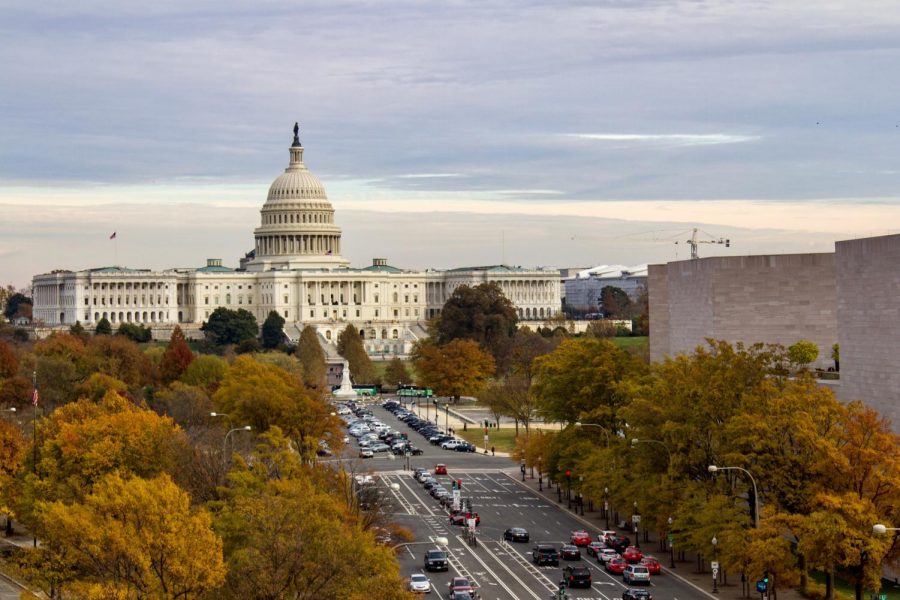It’s Time for the Electoral College to Retire
Although the Electoral College isn’t favored by many, we have used this method of voting for hundreds of years.
December 11, 2019
The Electoral College has been our voting system for hundreds of years, and has not always worked out in favor of the majority of the United States voters.
We should eliminate the Electoral College as a way to decide a presidential election. Even though our present voting system is supported by those who say that it looks out for smaller states, these alleged arguments do not outweigh the many problems with the Electoral College.
Our system of voting gives a certain amount of votes to each state based on population. For example, California has 55 electoral votes, while Oregon has 7 electoral votes. Smaller populated states are given fewer votes while larger, more populated states are given more.
There have been five times where a candidate has won the popular vote and then lost in the election. In 1824 Andrew Jackson lost to John Quincy Adams, in 1876 Samuel Tilden lost to Rutherford B. Hayes, in 1888 Grover Cleveland lost to Benjamin Harrison, in 2000 Al Gore lost to George W. Bush, and most recently, in 2016 Hillary Clinton lost to Donald J. Trump. The Electoral College results have been different from the popular vote twice in the last two decades, showing us that the presidents that have been chosen are not what the majority of the United States wanted.
According to the U.S. archives, the electors have no legal obligation to vote for their state’s majority vote. These electors are called “rogue electors”, but these rare votes have never decided a presidential election, according to the New York Times.
Electors can “go rogue” and not vote for their state’s majority, voting for who they want instead. For instance, in 1796 the first elector voted for a candidate that did not meet the state’s majority.
This is not fair to every voter in the United States. If we don’t eliminate the Electoral College altogether, then we need to change the rules for electors. Electors should represent a district in the state, and then those electors must vote based on that district’s majority.
Critics of the Electoral College point out that “those claims — that the Electoral College ensures rural representation, that its counter-majoritarian outcomes reflect the intentions of the framers and that it keeps large states from dominating small ones — don’t follow from the facts and are rooted more in folk civics than in how the system plays out in reality.”
President Trump is still a strong supporter of the Electoral College and so are many others.
“With the Popular Vote, you go to just the large states — the Cities would end up running the country. Smaller states & the entire midwest would end up losing all power — & we can’t let that happen. I used to like the idea of the Popular Vote, but now I realize the Electoral College is far better for the U.S.A.,” said President Trump.
This claim is false.
The states, such as Montana, Iowa, and Wyoming are not an accurate representation of the rural population in the United States. For instance, “Roughly 60 million Americans live in rural counties, and they aren’t all concentrated in “rural” states. Millions live in large and midsize states like California, New York, Illinois, Alabama and South Carolina.”
The voting system should not be based on population, but instead give equal power to every vote put into the election.
With the Electoral College as the voting system for president, your vote, at least in Oregon, means nothing in the larger picture. Your vote is only relevant in helping the elector decide what they are going to vote for. This is outrageous and should not be the way United States voters are treated.
Why do we only have the power of possibility, rather than having our vote actually mean something?
With a popular vote, each and every one of your votes counts, rather than having little to no meaning with the electoral college. In the future, we need to transition to the popular vote so that every ballot filled out is given an equal amount of influence.






Barb Bryan • Dec 18, 2019 at 12:09 pm
Keep in mind this advantage of the Electoral College system: the voters in a state only need to trust the vote-counters in their state in order to have confidence that their votes were tallied correctly. The reliability of each state’s tally is protected by the majority of the voters in that state who back some particular candidate or other.
In order for a general election model to work, voters across the nation need to trust that all the other states, including the ones who favor their opponents, are not stuffing the ballot box in favor of that opponent. In our present political climate, do you think voters would have that confidence? I don’t.
I have no idea why the The National Popular Vote Interstate Compact will have the support to solve this problem when there isn’t support for a change to the Constitution to replace the Electoral College. All it will accomplish is that voters in states that support it will occasionally see the candidate they supported with their majority vote be replaced with a candidate who was supported by less than a majority of its voters.
Ben Scott-Lewis • Dec 11, 2019 at 10:14 pm
I agree! Sadly, there is little momentum towards an amendment to the actual US constitution. But fear not! The National Popular Vote Interstate Compact isn’t too far off from rendering the electoral college useless. It’s an agreement to use all of a states electoral votes for the national popular votes and has been adopted by 15 states + DC. If enough states sign on, it will go into effect and the majority of electoral votes will go to the national popular candidate. It has almost 75% of the 270 votes necessary to be put into effect. For more info visit:
https://en.wikipedia.org/wiki/National_Popular_Vote_Interstate_Compact
(The following is written with all due respect and is not intended to offend, but rather to explain my point of view about another unrelated topic. Anyway…
Yes teachers, I did just cite a wikipedia page. Like many wikipedia pages, it happens to be quite comprehensive. Why? Because it has been written and edited by not one, but many people who are passionate about the topic. As long as wikipedia is approached with bias considered, it is one of the best online sources available. #wikipediaisawesome #schooldatabasesaredeath)
Honestly, the national popular vote movement has lost a bit of momentum, but the above mentioned still seems to be the best shot we have at eliminating the electoral college.
Great article Murphy!